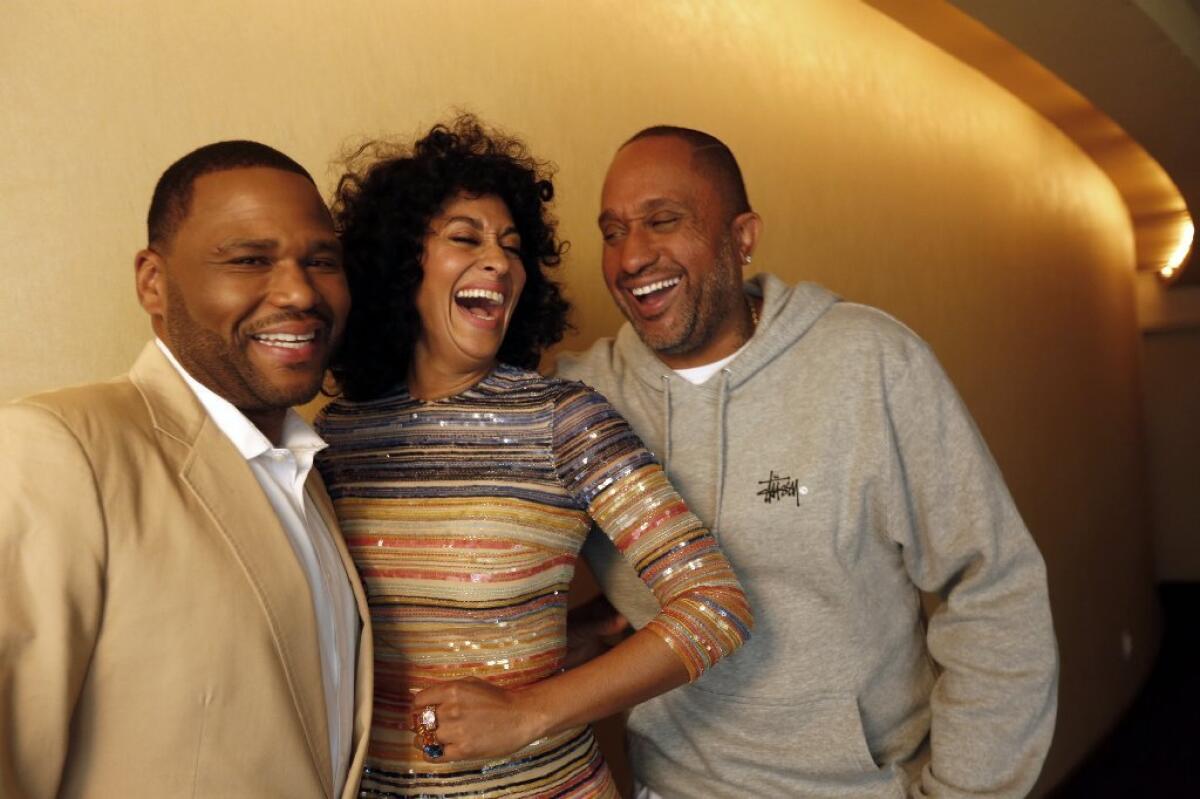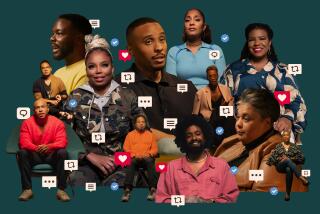‘black-ish’ looks to get the tough issues out in the open

- Share via
“black-ish” creator Kenya Barris is surprisingly modest for a writer who has almost single-handedly raised the bar for serious-minded sitcom writers everywhere. “We’re not preaching,” he told a recent PaleyFest crowd. “We’re not teaching. We’re just sharing.” And yet the ABC show’s second season has tackled some of the most complex and troubling issues around race, all within the context of a black family living in suburban Sherman Oaks.
Backstage at the Dolby Theatre in Hollywood, Barris and his two stars — Anthony Anderson, who’s also an executive producer, and Tracee Ellis Ross — took turns explaining how they made the awkwardness of the N-word funny and why Anderson’s own encounter with police brutality and last year’s Ferguson, Mo., unrest inspired the moving episode titled “Hope,” in which the family’s children are confused by the tensions surrounding the case of a white police officer who shot a black teen and the family’s adults are confused by their reactions — do they expect an unfair outcome or do they keep their faith in the judicial system?
It’s not a show about race. It’s not a black show. But it’s absolutely about a black family.
— ‘Black-ish’ showrunner Kenya Barris
You wrote the “Hope” episode over Christmas. Can you explain what inspired you?
Kenya Barris: It happened from my life. I think it was the Ferguson [unrest shown on TV]. My son turned around and literally said, “Why are these people so mad?” And I came into the room and I said, I have to tell this moment [on “black-ish”]. ... But I felt like [writing this] was going to be the end of my career.
Anthony Anderson: You feel like that after every episode.
Tracee Ellis Ross: It’s part of his process.
Barris: It wasn’t fun to do.
Ross: But you felt that way about the N-word [episode].
Barris: I felt that more because of obvious reasons. You can hide behind jokes. There’s so much you can hide behind humor. But this wasn’t a lot of jokes. And honestly, I had a movie to turn in and a pilot to turn in at the same time. So I literally had very little time. But it kind of just flowed out. [Looking at Ross] I talked to you about it at the time.
What were your conversations like?
Ross: All I do in our friendship is remind him to just keep telling the truth. This show is so specifically Kenya’s voice. And the more that Kenya is honest, the more that he has the courage to tell his truth.
Barris: This episode was particularly difficult because it’s so far from [Ross’] particular point of view. We had a lot of conversations about it. She understood it and embraced it.
Ross: And I was scared.
Barris: She was like, “I don’t want to be the white person or the person who doesn’t understand what this world is [in standing up for the judicial system].” But I was like, “We need that voice.”
Ross: This happened to be a subject matter that I had a lot of passionate, nuanced opinions about that aren’t necessarily meant for the episode. In hindsight, watching it, I really did see how important all the pieces were. That we needed each of these points of view. And the way they wrote it, it not only hinged on the context, it hinged on the kind of mother and parent that Bow was.
That’s how this show often transcends race.
Barris: It’s not a show about race. It’s not a black show. But it’s absolutely about a black family. That’s the difference. People try to put us in brackets. ... Together as intellectuals and creatives I’d like to feel we’re trying to start a conversation. We offer a different point of view and hopefully that starts a conversation. That’s better than knowing what to feel. It leads you to question.
Anthony, you had your own experience with police brutality.
Anderson: It was a simple thing, just walking down the street, 8:30 at night going to my buddy’s house to watch something on television. We were in his yard, walking up the back stairs to his kitchen and the police pulled up [and] demanded that we come to them. … Officer literally pushed the gate open and down. Smacked me across the face. Grabbed my boy by the collar and dragged him to the car. And another officer came and dragged me to the car and threw us on the hood, [which] is like 90 degrees. … We’re burning off our fingertips and singeing our skin. … The second time I was at a Ku Klux Klan rally in D.C. as part of Howard University protesting their march on D.C. I popped off from the mouth to the police. But I didn’t deserve to be beaten by nine police officers. But, yet again, lesson learned.
“The Word” episode also grappled with complex ideas and emotion, but with more humor.
Barris: Anthony and I both grew up when it was a term of endearment. … We were that “Autobiography of Malcolm X”-reading, Public Enemy [generation]. … Our kids are growing up in a very mixed population. They’re one of the only chocolate drops in their class. It was: How do we tell this story?
Ross: One of the amazing things about that episode was that the younger generation does not know the historical context of the word [but] so many young white boys come up to me and say they love the show. Between the ages of 8 and 12. Families are watching this show. The conversation has started.
Barris: We’re talking about things now that hit people in a different way, in a very sensitive place. So these words weigh a little heavier.

Yara Shahidi, who plays teenage Zoey on the ABC sitcom “black-ish,” talks with the L.A. Times about the show, her character and dreaming about calculus -- yes, math.
MORE:
What to watch tonight: ‘black-ish’ season finale pays homage to ‘Good Times’
The crucial advice Kerry Washington gave ‘black-ish’ actress Yara Shahidi
For KweliTV, streaming (black content) is the new black
More to Read
From the Oscars to the Emmys.
Get the Envelope newsletter for exclusive awards season coverage, behind-the-scenes stories from the Envelope podcast and columnist Glenn Whipp’s must-read analysis.
You may occasionally receive promotional content from the Los Angeles Times.










